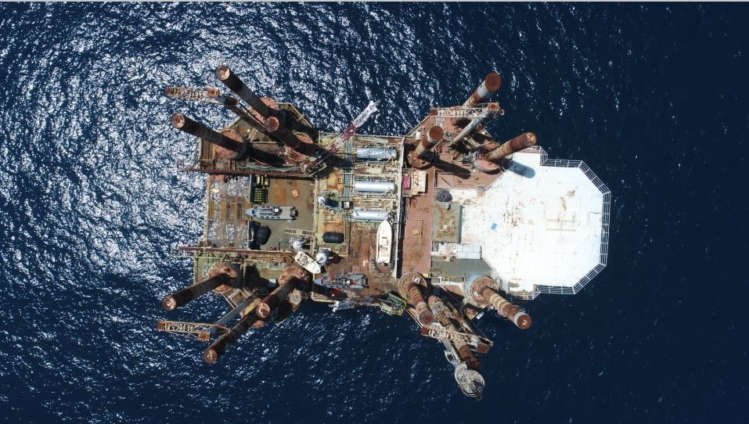The Ghana National Petroleum Commission (GNPC) has commenced the technical decommissioning of the Saltpond Oil Field in the Central Region.
This follows the arrival of vessels and equipment needed to fully execute the year-long exercise.
The vessels which arrived in Ghana waters at 6 am last Thursday from Lagos arrived in Saltpond on Saturday to complete the second phase of the exercise which involves the removal of pipes, plugging and abandonment of the Louis Platform.
The decommissioning exercise is estimated to take 12 months. The exercise will be undertaken by Hans & Co Oil and Gas Company Ltd, a Ghanaian company working with selected experts with support from a project management consultant.
Addressing the press in Saltpond on Sunday, following the arrival of the vessels and equipment, Dr Kwame Baah – Nuakoh, General Manager – Sustainability and Stakeholder Relations at GNPC, assured the public that the Corporation has received the necessary permits to undertake this important exercise.
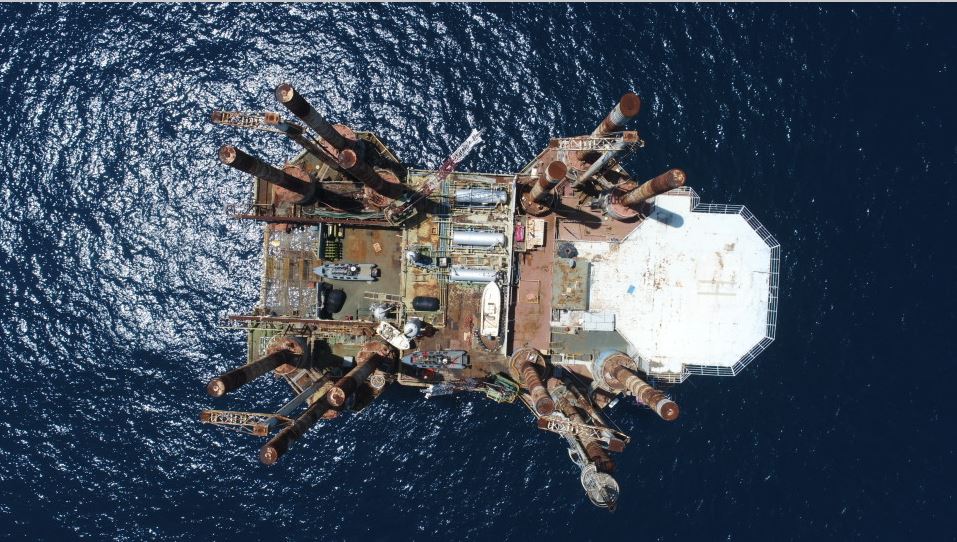
He said, “as the National Oil Company, we are committed to safeguarding both human and aquatic life, so we are working closely with the Petroleum Commission, EPA, Ghana Maritime Authority, Ghana Navy, traditional authorities and the fishermen in the catchment areas to ensure that all the necessary stakeholder consultations and permits are secured.”
He further emphasized that the Corporation has also put in place a robust emergency response plan of international standards to manage any incident, in the unlikely event - it occurs.
It will be recalled that in August 2016, the Minister of Energy directed GNPC to decommission the field based on the recommendations from state institutions such as the PC and EPA.
Subsequent to that a field decommissioning process was initiated in 2018 with the first phase of decommissioning studies and the development of a decommissioning plan duly completed and approved by the Minister of Energy.
Background of the SOPCL
The Saltpond Oil Field is the oldest oil field offshore Ghana which was discovered in 1970 by Signal-Amoco Consortium.
Amoco Consortium relinquished the concession in 1976, citing the field as non-commercial.
The concession was then assigned to Offshore Hydrocarbons Ltd., which later entered into a development farmout with Agri-Petco of the United States.
In 1977–1978 Agri-Petco drilled six appraisal wells from a centrally located jack-up rig called Mr Louie. After the drilling, the jack-up was converted into a production unit and the field was put on stream in October 1978.
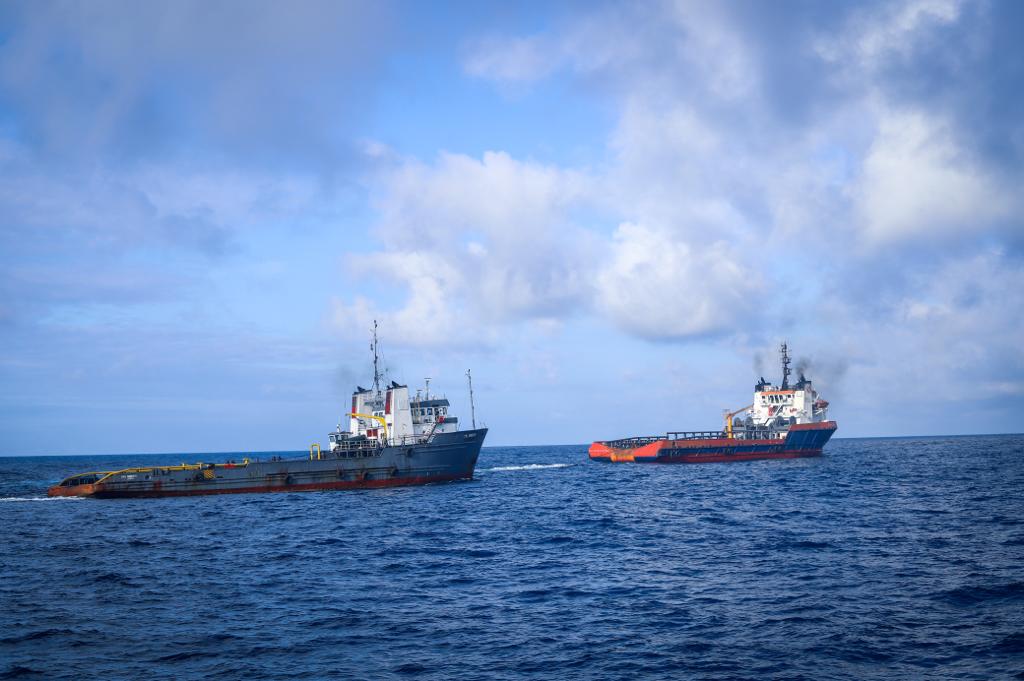
In 1984, the field was reassigned to Primary Fuels Inc., which took over the operation for a year. In July 1985 GNPC took over the operation of the field after the field had been shut-in due to non-commerciality.
From 1978 to 1985 the maximum oil production was 4,800 barrels per day (760 m3/d) of oil. When operation stopped in 1985, the volume of production was 580 barrels per day (92 m3/d) of oil.
The estimated percentages of oil and gas that had been exploited from the field at the time of shutdown were 10.4% and 25%, respectively, with three of the six wells unable to produce oil.
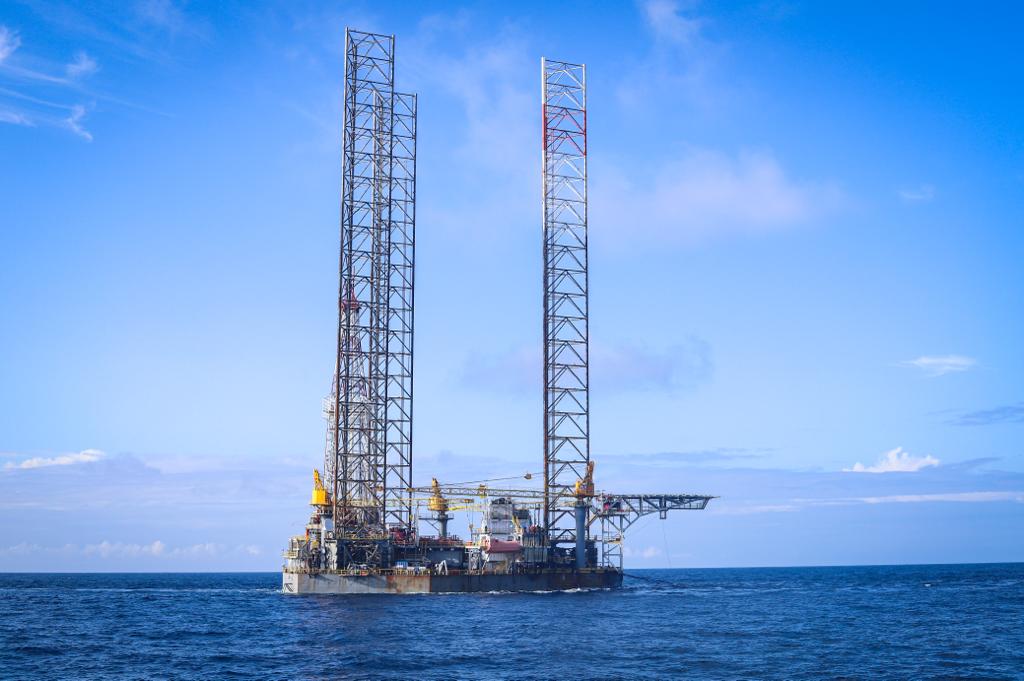
On 18th January 2000, GNPC entered into an agreement with Lushann International of Houston, Texas, for the rehabilitation of the Saltpond Oil Field and the implementation of the rig-less workover proposal.
Lushann International contracted Eternit Universal Ltd. of Nigeria for the financing of the rehabilitation works. In August 2000, rehabilitation works commenced with the repair of the Mr Louie platform.
In 2002, Oildata's programme of rig-less workover discovered obstructions in the wells which prevented access to the bottom of most of the wells.
When the workover was completed, only two wells were able to produce between 480–600 bopd (76– 95 m3/d). Lushann International was also granted the right to develop up to 400 MW of power generation facilities to commercialize natural gas from the Saltpond Field.
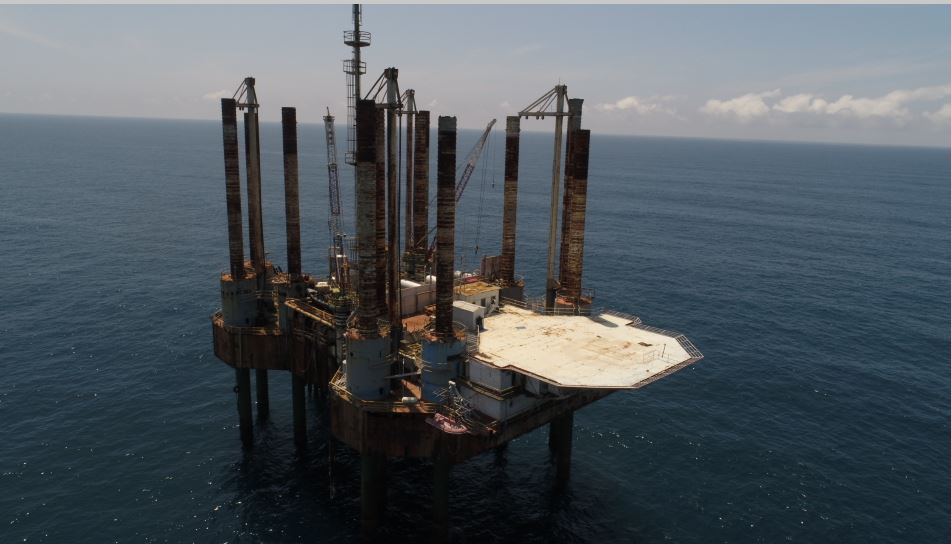
In 2002, the Government of Ghana began re-negotiating the agreement between GNPC and Lushann-Eternit Energy Ltd.
The negotiations ended in 2004 with a new agreement in which GNPC's stake was increased from 40% to 45%, with Lushann- Eternit Energy Ltd. having 55%.
The new agreement led to the creation of the Saltpond Offshore Producing Company, which marketed the oil from the fields on the world market.
The rig-less workover could not sustain high production, resulting in a drop of about 450 barrels per day (72 m3/d) of oil. In 2005, operations were suspended so the rig-less workover could be replaced.
Operations resumed in April 2006 with an increase in production to 700 barrels per day (110 m3/d) from two wells.
The Field recorded a continuous decline in production until December 2015 when oil production was below 200 bopd.
Production operations ceased on 23rd December 2015 due to financial issues and Saltpond Field’s inability to remain economically viable. The remaining reserve is about 0.35MMBO.
The Minister of Petroleum constituted an inter-agency committee to review the state of the Saltpond Field and advise the way forward. In June 2016, the committee presented its report.
Among other recommendations were two main ones: termination of the Petroleum Agreement for non-performance and cessation and subsequent decommissioning of the Saltpond Field.
In August 2016, the Minister of Petroleum wrote to Lushann Eternit to terminate the Saltpond Field Petroleum activities.
Why Saltpond Field Decommissioning
The Production on the field has depleted over the years. The Field has exhausted almost the recoverable reserves and therefore oil produced is so low that it is unable to meet operational costs, hence it has become unprofitable.
Production has moved from 4,800 bopd in 1985 to below 200 bopd in 2015. Production has gotten to a stage where the flow of oil had become economically non-viable.
Subsequently, the Petroleum Agreement was terminated by the then Minister of Petroleum in August 2016 upon the advice of an inter-Ministerial committee.
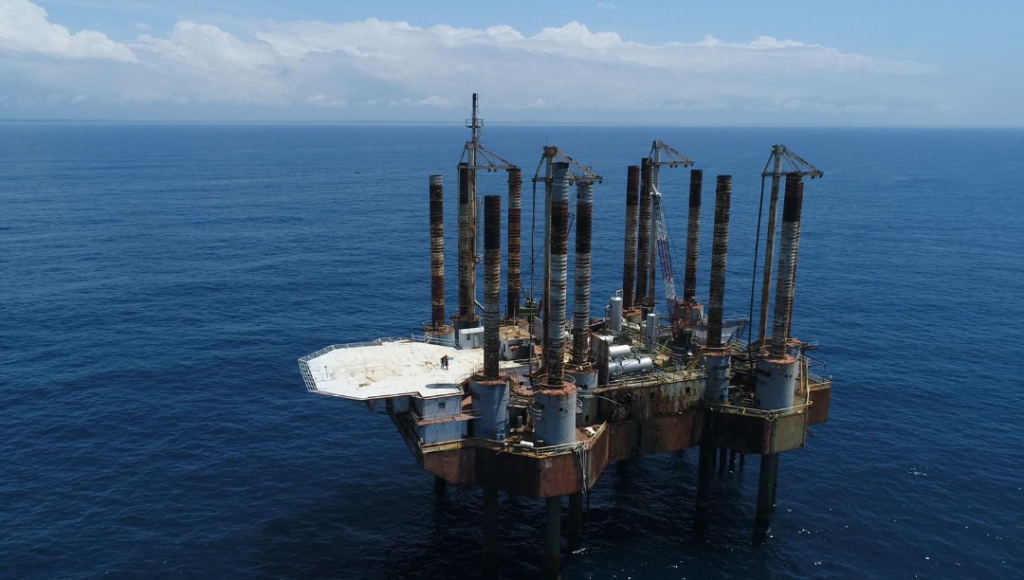
In September 2016, GNPC publicly announced the decommissioning of the Saltpond Field.
This was informed by some of the conditions stated below:
- The Platform and wells are in a deplorable state, posing danger to the crew on board and seafarers.
- The wells and wellheads are in a deplorable state, a breach of which may lead to spillage of oil which would adversely impact aquatic life and the lives of the fishermen and those with facilities along the beaches.
- If the structure is not removed, it may pose a danger to workers, sea, aquatic life and in a worst-case scenario community along the coastline.
- Major incidents could affect the reputation of GNPC and ultimately affect the social license to operate.
Decommissioning of the field is therefore considered a milestone not only to stop a financially disastrous operation but also to protect the environment
Latest Stories
-
Baby abandoned in manhole in Tema Community 1
4 mins -
We’ll establish fiscal council to rein in excessive borrowing – Finance Minister
11 mins -
Mortuary workers issue fresh strike threat
15 mins -
‘Lapses in banking system are not unique’ – John Awuah on managing fraud in Ghana’s Banks
23 mins -
Bawumia confident of victory in 2024 election
57 mins -
Strengthening audit institutions essential for tackling fiscal mismanagement – Domelevo
1 hour -
Healthy Aging: The Role of the Gut Microbiome and How Diet Can Help
1 hour -
Seek medical care, diagnosis for breast cancer – Dr Abiti to women
1 hour -
Hardship: Men now collect marriage list from different families to get cheapest – Report
1 hour -
‘If you’re looking for trouble, you’ll get it,’ Falz tells VeryDarkMan
1 hour -
Paramount Chief of Avenor grateful to NPP, calls for completion of Agenda 111 project
2 hours -
Bawumia commissions ultramodern office complex for Ho Municipal Assembly
2 hours -
Bawumia declares NPP’s infrastructure record unmatched
2 hours -
Importers face duty on Electric Vehicles despite gov’t’s exemption promises
2 hours -
4 additional Democracy Hub protesters discharged
2 hours

